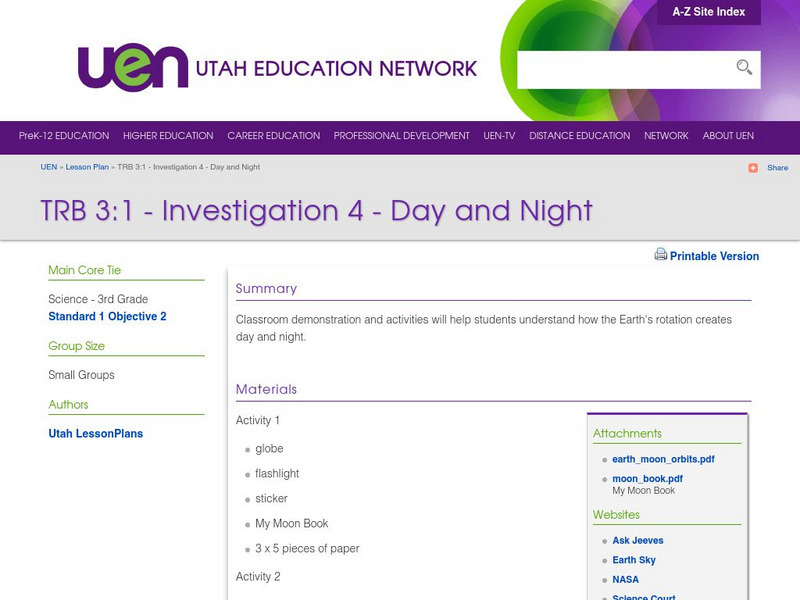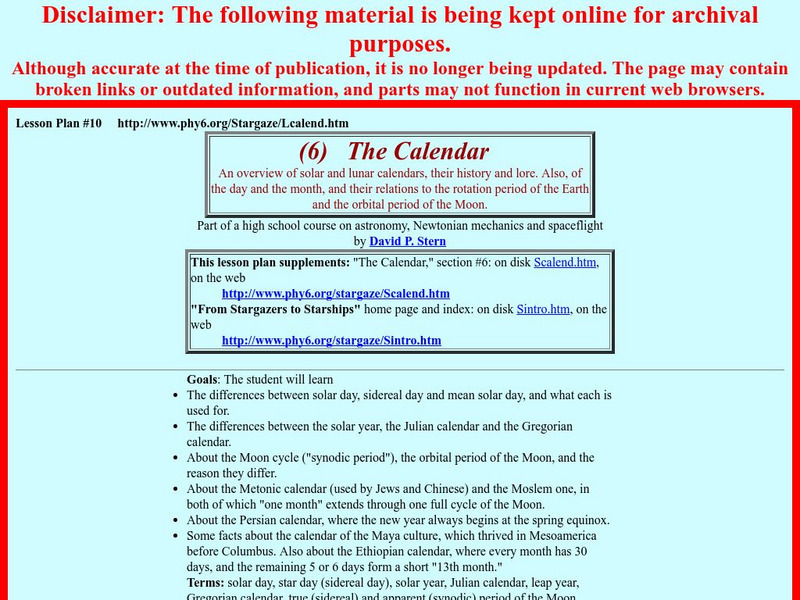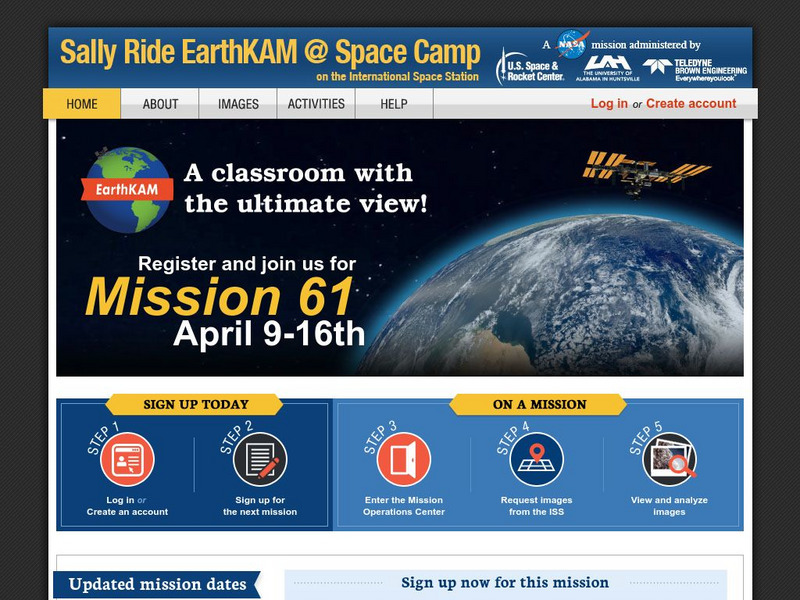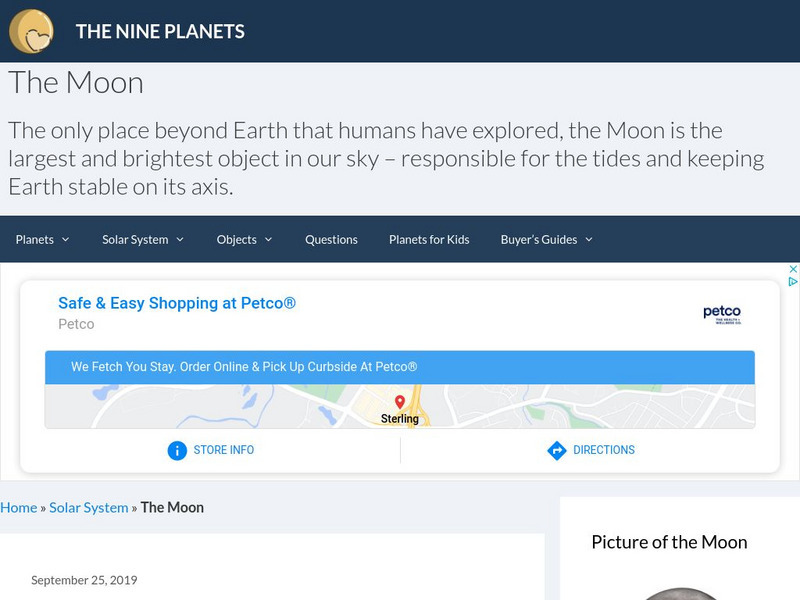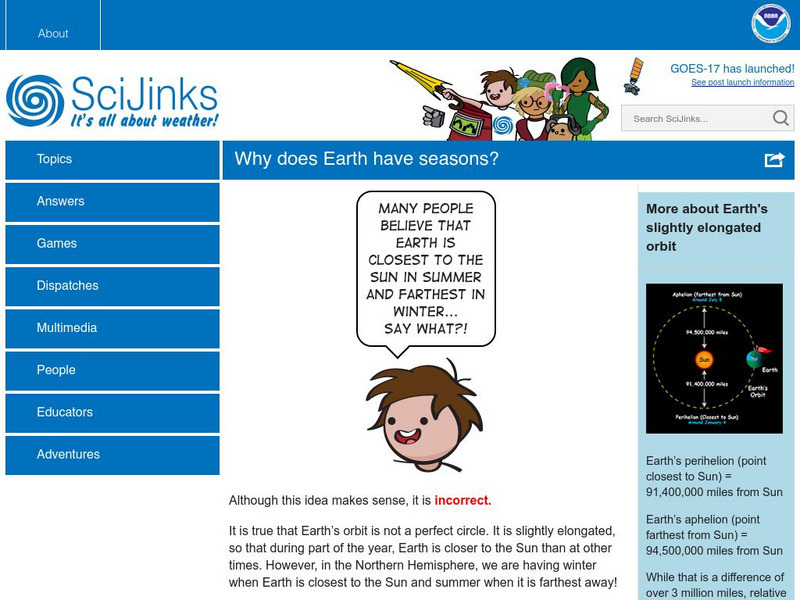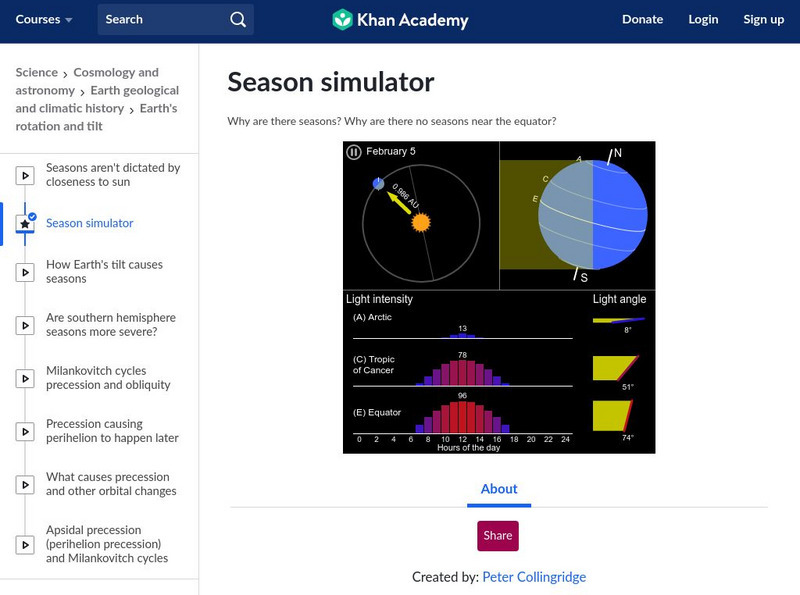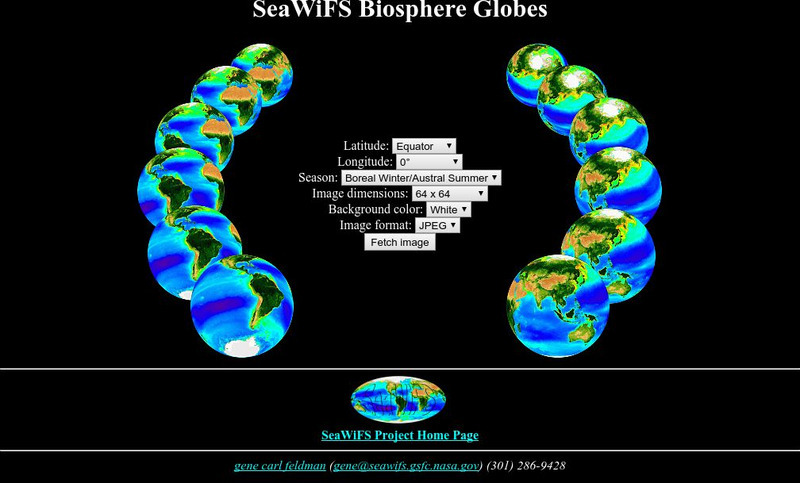Science Education Resource Center at Carleton College
Serc: Mn Step: The Earth and Sky in a 24 Hour Day
An activity where young scholars learn, through modeling and demonstration, about the relative sizes of the Earth and Sun, the distance between them, and how the Earth rotates in a 24-hour period.
Georgia Department of Education
Ga Virtual Learning: The Moon
In this interactive tutorial students will explore what it is like on the Moon. Learn why the shape of the Moon seem to change and also about lunar eclipses. Discover why the tide changes twice a day and explore how the cycle of the Moon...
NASA
Nasa: Eclipse Predictions and Earth's Rotations
An insightful website from NASA that presents a series of different questions about the rotation of the Earth.
Utah Education Network
Uen: Trb 3:1: Investigation 4: Day and Night
A lesson for third graders in which they learn about the rotation of the Earth on its axis and how this movement creates day and night. They also examine the orbit of the moon about the Earth and the Earth's orbit around the sun.
Utah Education Network
Uen: As the World Turns
Third graders use their bodies to act out the motions of earth.
Science Buddies
Science Buddies: A Matter of Degrees: Tilt of Earth's Axis Affects the Seasons
In this science fair project, use a globe and a heat lamp to investigate how the angle of the Sun affects global warming. This project includes the objective, background questions, a list of all the materials you'll need, and the...
PBS
Pbs Learning Media: Giving Rise to the Jet Stream
This interactive activity from NOVA Online uses animation and graphics to offer a detailed explanation of the jet stream. A thorough account is given of the role played by the Sun's heat and Earth's shape and rotation, among other factors.
OpenStax
Open Stax: Gyroscopic Effects: Vector Aspects of Angular Momentum
From a chapter on Rotational Motion and Angular Momentum in a Physics textbook. This section of the chapter explains how to use the right-hand rule to determine direction for angular velocity, momentum, and torque. Also discusses the...
Illustrative Mathematics
Illustrative Mathematics: G Mg Tilt of Earth's Axis and the Four Seasons
This task gives students a chance to explore the effects of the Earth's tilt and rotation using a simple geometric model of Earth-Sun interaction that shows why the seasons occur. Aligns with G-MG.A.1.
NASA
Nasa: From Stargazers to Starships: The Calendar
A lesson plan that gives an overview of solar and lunar calendars, their history and lore. Also, of the day and the month, and their relations to the rotational period of the Earth and the orbital period of the Moon.For versions in...
Other
Nasa: Iss Earth Kam
Students get a whole new perspective of the world through images obtained from the International Space Station. Students can even request images to be taken through ISS EarthKAM. Activities and educator guides are provided.
Other
Earth Science: Earth's Surface and Heat [Pdf]
This textbook chapter looks at the role of temperature in sustaining life on Earth and on weather and climate. It discusses the Earth's movements and the seasons, the circulation of the oceans, wind and weather, and the water cycle....
Nine Planets
The Nine Planets: The Moon
Explore the mythology, structure, observational history, gravitational force, and orbit of Earth's Moon.
NASA
National Aeronautics and Space Administration: Scijinks: Seasons
An explanation about the rotation of the Earth and why the Earth has seasons.
National Museums Liverpool
Liverpool Museums: The Sun Tracker
This simulation allows the user to see the sun's arc in the sky anywhere in the world at any time. By changing the season settings the user can see how seasons affect the height of the sun's arc.
Exploratorium
Exploratorium: Science Snacks: Reflections of a Star
This simple lesson allows students to work cooperatively in determining the angular diameter of the Sun.
Geography 4 kids
Geography4 kids.com: Earth Around the Sun
Find out what all results from Earth revolving around the sun every 365 days as well as the rotation of the Earth every 24 hours.
Khan Academy
Khan Academy: Cosmology and Astronomy: Season Simulator
This season simulator takes Earth through an entire year cycle allowing the viewer to observe the tilt of the Earth and the intensity of the sunlight.
University of Wisconsin
University of Wisconsin: Reasons for the Seasons
A brief explanation of the Earth's rotation around the Sun and how it relates to the amount of sunlight the Earth receives, and to the seasons. Includes two questions for students to respond to.
Smithsonian Institution
Encyclopedia Smithsonian: Foucault Pendulum
Provides a detailed description of the Foucault Pendulum and how it works. It was originally built to demonstrate the rotation of the Earth.
University of Texas at Austin
The University of Texas Mc Donald Observatory: Earth's Moon
Discover interesting facts about Earth's partner, the moon, which is more like a double planet than a planet and a moon.
ClassFlow
Class Flow: Earth, Sun and Moon
[Free Registration/Login Required] In this unit children learn about the shapes and relative sizes of the Earth, Sun and Moon. Using models they learn how the three bodies move relative to each other and how these movements relate to...
TeachEngineering
Teach Engineering: Lunar Lollipops
The students work in teams of two to discover the relative positions of the Earth, Sun and Moon that produce the different phases of the Moon. The students will be given a Styrofoam ball that they will attach to a pencil so that it looks...
NASA
Nasa: Sea Wi Fs Biosphere Globes
This interactive globe allows you to get any view of the earth by entering latitude, longitude and season criteria.



